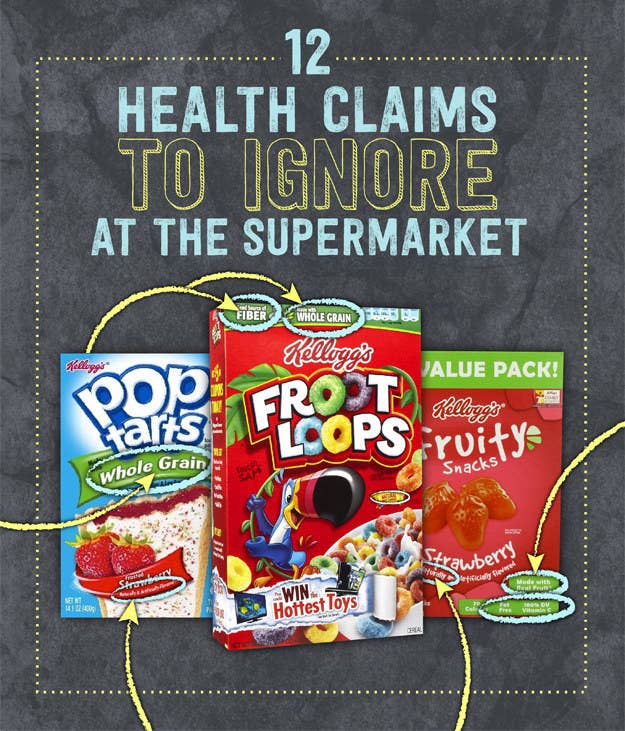
You know not to believe everything you read. But at the supermarket, it's hard to resist the comfort of thinking maybe that chocolate bar really is a good source of protein. Alas, the claims on your favorite processed foods are there for one reason, and it's not education. "The health claims on packaging are there because they sell products," says Laurie David, executive producer of Fed Up, a new documentary film that examines the causes and consequences of the childhood obesity epidemic. And despite all the lingo floating around the supermarket, knowing the difference between healthy food and junk food has never been harder. "Even people who know a lot about food don't necessarily know," David says.
1. Claim: "Made With Whole Grain"

Truth: The small amount of whole grains doesn't cancel out everything else.
"It is true that these products are made with whole grain," says Amy Shapiro, MS, RD, CDN, and founder of Real Nutrition NYC. "But because of the amount of sugar in these cereals, they're doing more harm than good."
And since there's no requirement for how much whole grain a product needs to make this claim, a more precise way to put it, according to the Center for Science in the Public Interest, might be "made with mostly white flour."
2. Claim: Great Source of [Important Nutrient]!
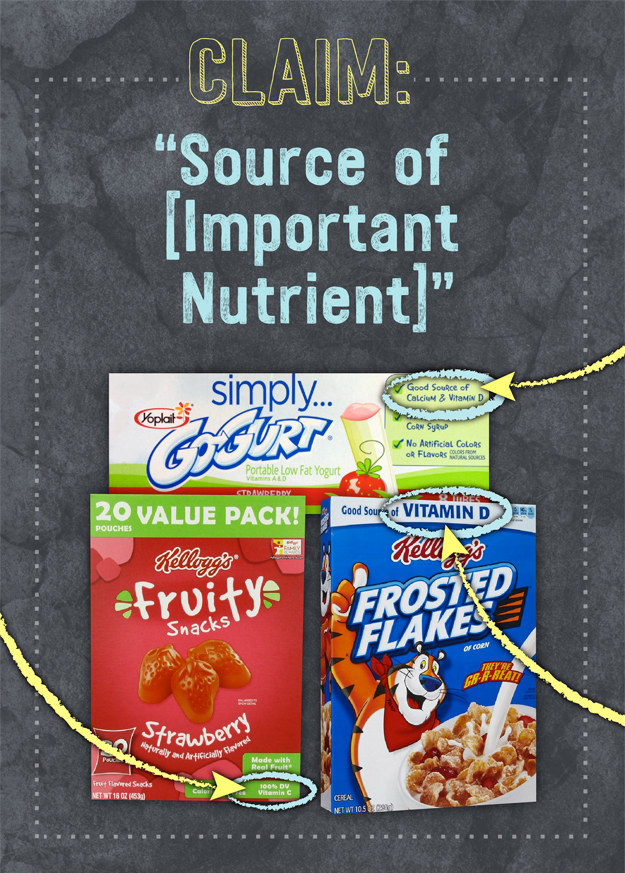
Truth: The nutrient is actually highly processed and, therefore, not that beneficial to your health.
Despite the claims on the boxes, the best way to get your vitamins is from the real foods where they naturally occur. "In a piece of fruit," for example, "we benefit from an array of phytochemicals that complement each other and nourish our bodies in ways that eating Vitamin C alone would not," says Ora Warmflash, a Brooklyn-based Nutritionist and Certified Health Coach and co-founder of tABLE health.
Plus, she adds, "These processed foods are often loaded with added sugar making them an unhealthy choice."
3. Claim: "Natural," "All Natural," and "Made With Natural Flavors"
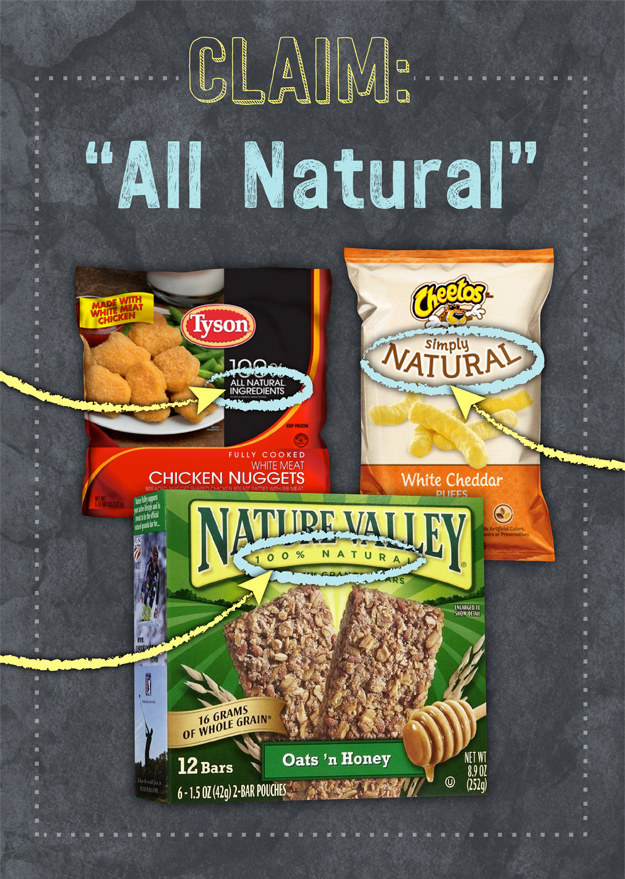
Truth: The word "natural" is meaningless when it comes to food labels.
When Cheetos and chicken nuggets can call themselves natural, something is very, very wrong. The FDA has repeatedly dodged opportunities to define the word (for non-meat or dairy foods), and the USDA says meat and dairy are "natural" as long as they contain "no artificial ingredient or added color and [are] only minimally processed." So until somebody comes up with a better definition, ignore the word entirely.
4. Claim: Great source of protein!
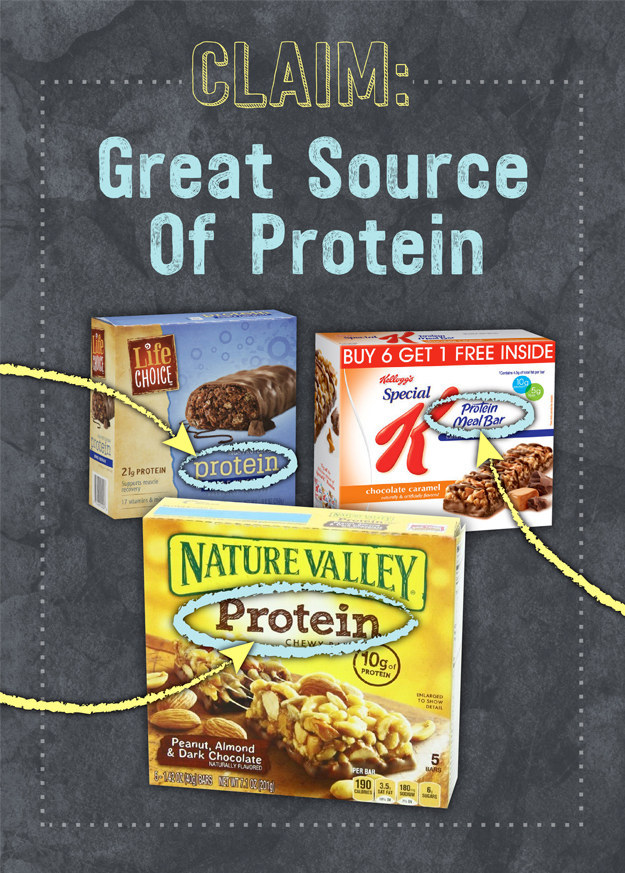
Truth: The protein is highly processed and served with too much sugar.
"You need to look at the source of the protein," says Shapiro. "Most is coming from soy protein isolate which is a very broken down form of soy I do not recommend my clients eating."
You also need to be careful about what you're getting with your protein. "The Special K Protein Meal Bar has 15 grams of sugar which is like adding 3.5 teaspoons of sugar to your lunch," Shapiro points out. "They also have partially hydrogenated oils which means trans fat."
5. Claim: "Made With Real Fruit"
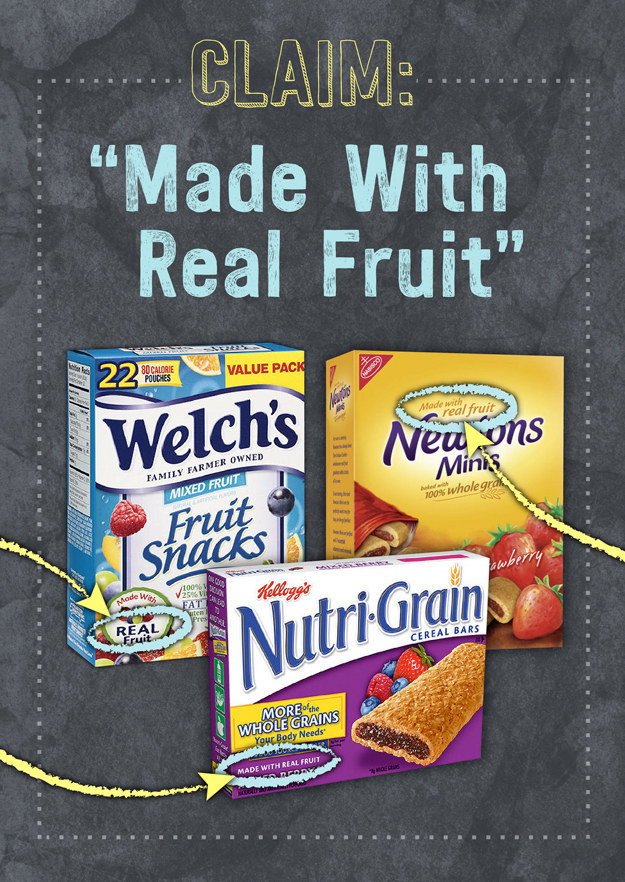
Truth: Usually the “real fruit” is actually a highly processed fruit puree or fruit juice, which just concentrates their sugar.
"Nutrients are lost in the processing of the fruit puree and even more so in the products containing fruit juice," says Kylie Deppen, Holistic Health & Nutrition Coach, AADP and Founder of Joyful Health & Wellness. "Often times fruit juice concentrates simply become concentrated sugar while losing the nutritional health benefits of the fruit."
6. Claim: "Sugar Free"
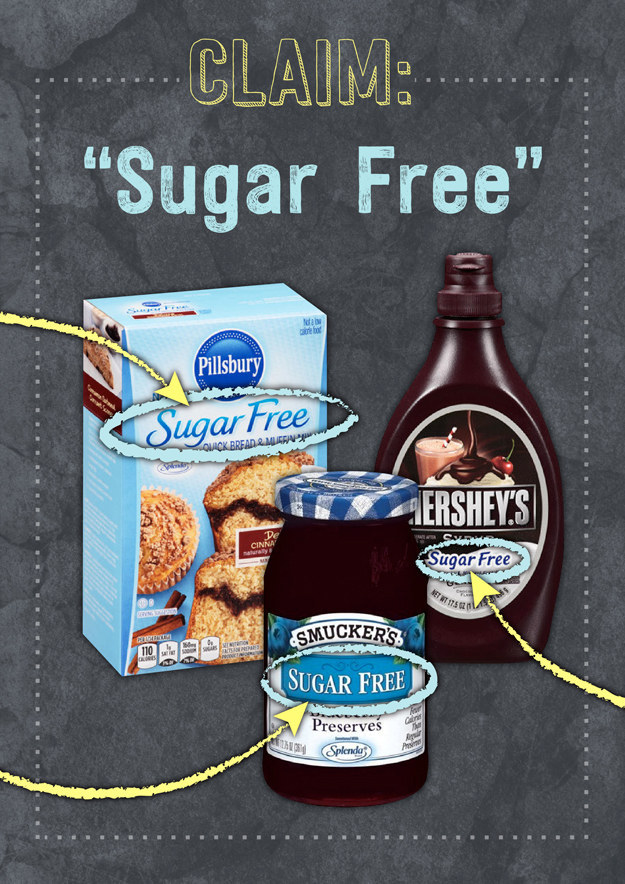
Truth: Filled with artificial sweeteners instead.
"The claim is true that these products don't contain real sugar," Deppen says, "but they do contain many forms of artificial sweeteners which are controversial ingredients at best."
And they're unlikely to help you lose weight. "Many of my clients lose significant weight simply by eliminating artificial sweeteners from their diet."
7. Claim: "Low Fat" or "Reduced Fat"
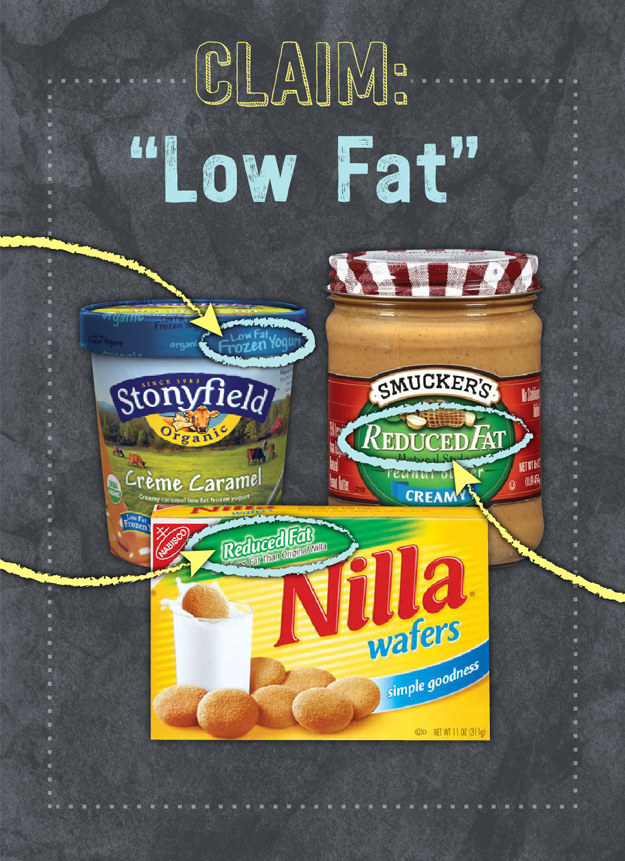
Truth: Probably high in sugar and/or other processed substances.
Don't confuse "low fat" with healthy or even weight-loss conducive. In fact, the opposite may be true: Because manufacturers need to find ways to make low-fat products actually taste good, they often end up being dramatically higher in sugar and other highly processed substances than the original versions.
8. Claim: "Fat Free"
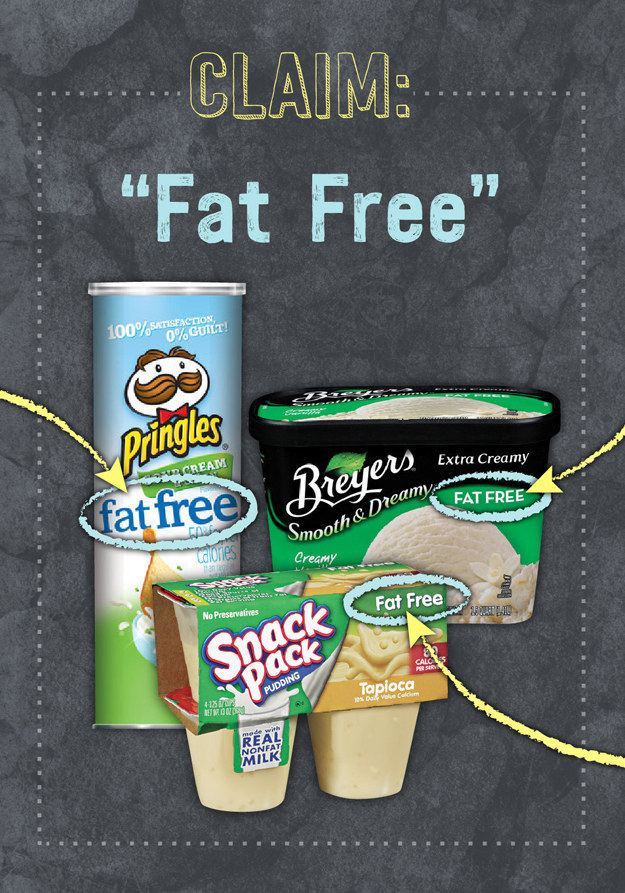
Truth: Probably filled with sugar and/or artificial junk.
"The important question to consider is: What is replacing the sugar and fat in these products?," Warmflash says. "The answer is likely a bunch of artificial junk that our digestive systems are not meant to handle."
"If you see anything that says 'fat free' or 'low fat' on the package, that's a huge warning sign to avoid it," says Dr. Peter Attia of the Nutrition Science Initiative on his blog.
9. Claim: "0g Trans Fat"
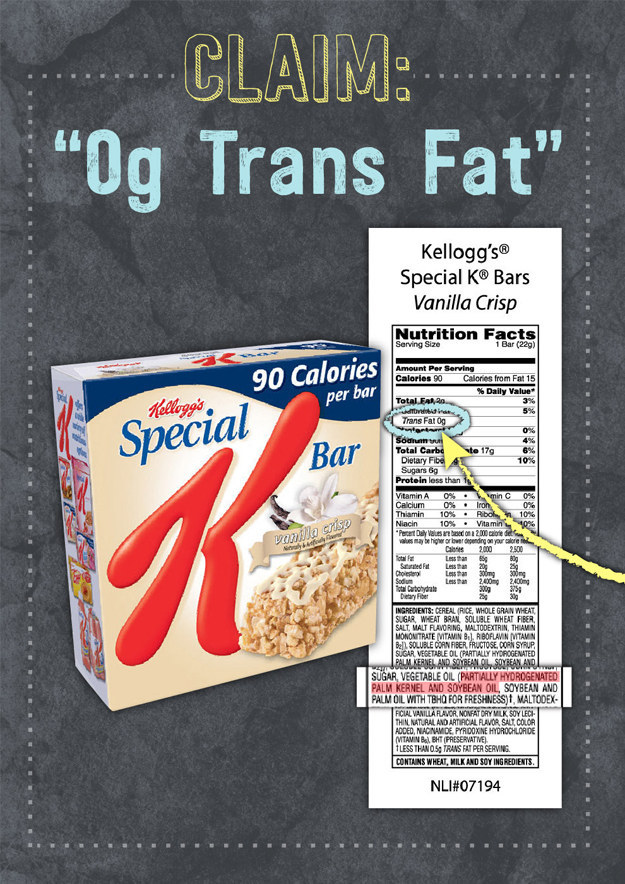
Truth: Up to 1/2g of trans fat per serving.
"Legally a brand can say they have zero trans fat as long as they have less than half a gram of trans fat per serving," says Shapiro. "But if you are eating more than one serving you are getting a full gram and that is not good. To really tell you need to check the ingredient list and look for partially hydrogenated oils."
10. Claim: "No Cholesterol"
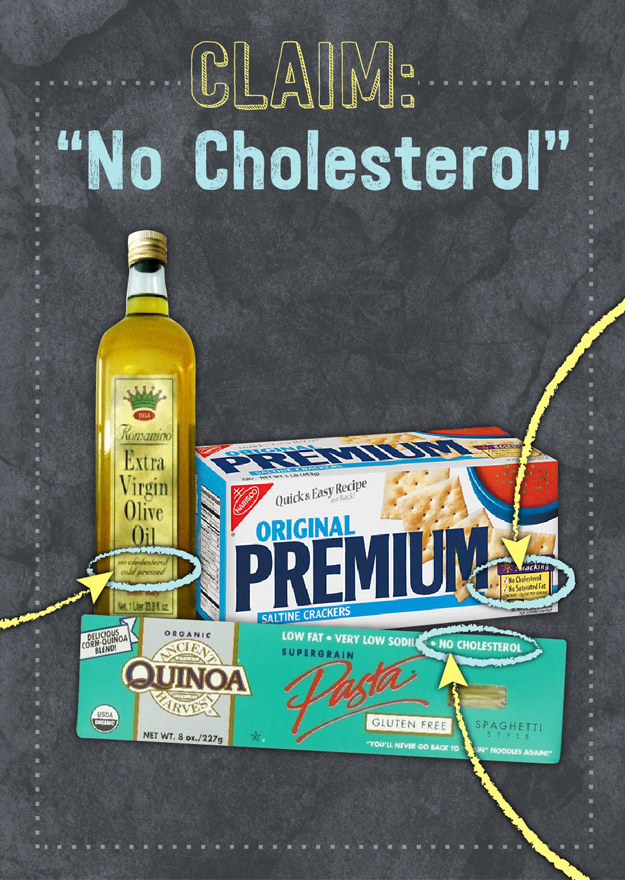
Truth: There probably wasn't going to be any cholesterol in this anyway.
Cholesterol only occurs in animal products like meat and dairy, so if a cracker or pasta brags about not having any cholesterol, it's really just stating the obvious. Saltines, for example, don't have cholesterol in them, but that doesn't mean it makes sense for them to put that on the box.
(And psst, like with trans fat... "Cholesterol Free" doesn't mean 0g of cholesterol, it means less than 2mg.)
11. Claim: "Gluten Free"
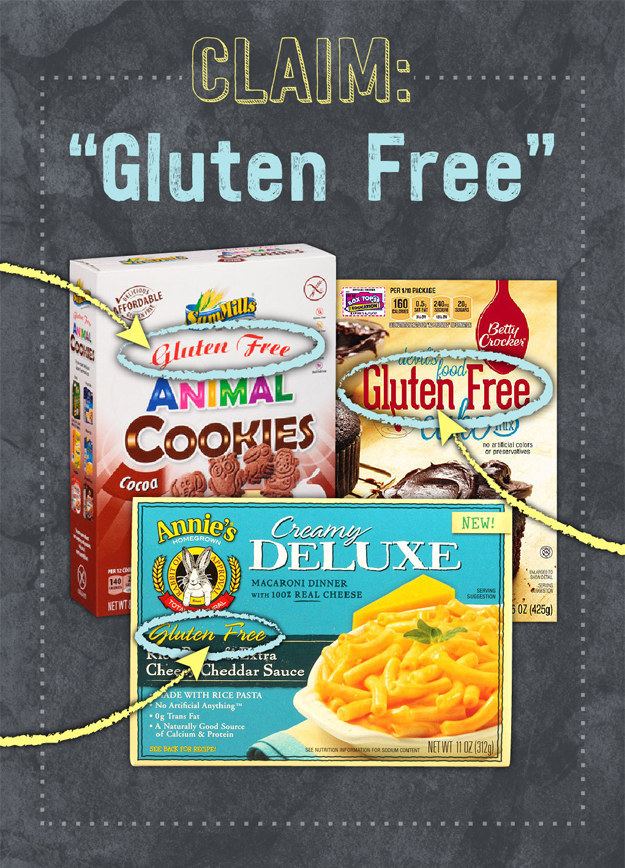
Truth: Unless you have celiac disease, gluten-free isn't necessarily healthier.
If you have celiac disease, the gluten-free labels at the supermarket are important and can help guide your choices. If not, ignore them.
"I don't think a gluten-free diet is a healthier option for the general public," Laura Manning, an RD in the Division of Gastroenterology at the Mount Sinai Hospital told BuzzFeed. Click here for more information about gluten-free diets and celiac disease.
12. Claim: Rich in Omega-3s
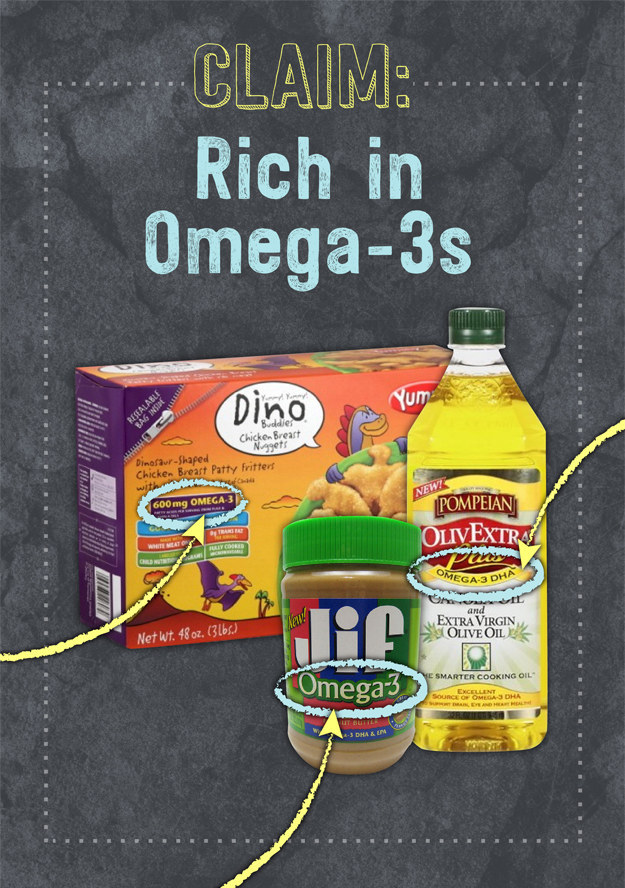
Truth: Those Omega-3s may come from added fish gelatin and don't make the product any healthier.
Omega-3s are important but check the ingredients on the products that claim to be a great source of them. JIF gets Omega-3's into its peanut butter by adding anchovy, sardine oil, and something called "tilapia gelatin." Pompeian's OlivExtra Canola Oil and Extra Virgin Olive Oil gets its Omega-3s from algae. Those added Omega-3s aren't making the product any healthier; food companies are just adding fish products so they can boast a trendy health label that's meaningless.
As for the chicken nuggets boasting 600 mg of Omega-3 (from flax meal), "use some common sense," advises Dr. Sharon Allison-Ottey, a physician, health educator and consultant. Breaded and fried chicken is NOT healthy. Get your Omega-3s from foods like salmon or avocado instead.

